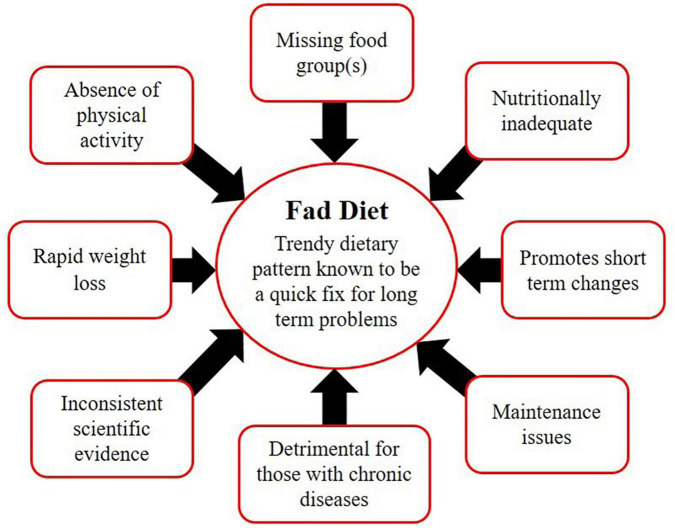
A quick fix solution to weight loss, one of the trendy options is a fad diet. Some of the popular fad diets that you can relate to are the vegetarian diet, detox and the ketogenic diet. But its effect has always been in question. A recent study published on Taylor & Francis Online surveyed undergraduate students on their knowledge and acceptability of fad diets1.
The opinion for fad diet among them was surprisingly different from expectation. This exciting research paper reveals the current trend of fad diets among young university graduates. It also allows us to learn more about fad diets and their bad effects on our health.
Measuring the trend of fad diets among university undergraduates
The scientists in the United States were looking for evidence of how knowledgeable and interested the undergrads were to accept a fad diet as their choice to shed extra weight. University is where young people go through unhealthy life practices due to a shortage of time due to busy schedules, readily available foods with high caloric content, and the expensive cost of healthy foods.
In such a restricted environment, if any undergraduate students would like to lose weight, the fad diet might be a lucrative option for them. But, what the researchers found was completely different. We will learn about the exciting results, but let us first try understanding a fad diet.
What is a fad diet?
A fad diet is a trendy weight loss plan that promises quick and easy results. These diets usually restrict certain foods or groups and may require supplements or other products. However, fad diets often lack scientific evidence to support their claims and can be harmful to your health in the long run.
Here is a diagram showing typical characteristics of fad diets as published on Frontiers in Nutrition. You can notice how fad diet restricts certain groups of foods, leading to nutritional inadequacy. These diet programs do not focus on physical activity; we know the importance of physical activity and exercise for a healthy life. In many cases, there was an issue of sticking to the diet.

Some examples of fad diets include the Atkins diet, vegetarian diet and ketogenic diet. Atkins’s diet focuses on a low carbohydrate and high protein diet, mobilising body fat for faster weight loss. The ketogenic diet is another low carbohydrate but very low carbohydrate diet originally designed to reduce epileptic seizure3. A vegetarian diet is another example of a fad diet that restricts any animal-based food.
Why Fad Diets Don’t Work: A Science-Based Explanation
This diet may be effective against weight loss, but there is no solid evidence to claim this. Although they are capable of long-term term loss, several studies reveal their harmful effects on health. Referring to the image on the characteristics of fad diets, you can see that it can lead to nutritional inadequacy due to the complete elimination of one or more essential food groups2.
For example, an Atkins diet for six weeks or more increases the risk of kidney stone formation4. The study also finds that half of the strict vegans are vitamin B-12 deficient, as there is no plant source for this vitamin. As a result, vegans lack the beneficial effect of vitamin B-12, and its deficiency can lead to low blood formation in the body, muscle weakness, etc.
What was the opinion of undergrads regarding fad diet?
The US researchers for the current study to understand the mood of undergraduates for fad diet, recruited undergraduate students from Midwestern University in Arizona, United States. The average age of the participants was 19 years. They collected their knowledge and opinions through focus groups and individual interviews.
Surprisingly, their opinion regarding the fad diet was negative. According to the fad diet:
- Did not lead to sustained weight loss.
- Were associated with disappointment and health issues.
- Were money-making schemes delivered heavily through social media?
There was another surprise that was revealed in the study. Most participants learned about fad diets on social media, with Instagram being the most common source. Another source was through family members and acquaintances who follow a fad diet.
Participants also valued healthy eating and good nutrition.
Healthy Eating Habits
The current study’s participants ditched fad diets and stressed healthy eating habits. Healthy eating habits refer to the patterns of food intake that promote overall health and well-being. It involves making conscious choices to consume foods and drinks that provide the body with the essential nutrients it needs to function optimally. This includes eating fruits, vegetables, whole grains, lean proteins, and healthy fats while limiting or avoiding foods high in added sugars, saturated fats, and sodium.
Incorporating healthy eating habits into your daily routine can significantly impact your physical and mental health in a positive way.. It can reduce the risk of chronic diseases such as heart disease, diabetes, and certain cancers while improving energy levels, mood, and cognitive function. Additionally, practising mindful eating by paying attention to hunger and fullness cues and taking time to savour and enjoy meals can promote a positive relationship with food and reduce the likelihood of overeating.
Some tips for developing healthy eating habits include planning meals and snacks, choosing whole foods over processed options, cooking at home more often, and being mindful of portion sizes. Staying hydrated is also important by drinking plenty of water throughout the day.
Healthy eating habits can be a powerful tool in achieving and maintaining a healthy lifestyle.
Final takeaway
In the era of instant gratification, the fad diet is a lucrative option to fix the overweight issue quickly. On the one hand, it may help in weight loss temporarily, but the long-term effect is detrimental to overall health. On top of this, there is not enough scientific evidence to prove its efficacy.
This research also highlights the role of social media in making fad diets a fashion. Fortunately, the younger generation is increasingly becoming aware of this and looking forward to rather healthy eating habits. In the study paper, one of the participants replied on being asked for foods to avoid: “A personal decision. Well, it’s mixed with, like in my community, how heart problems are a huge thing. It’s mostly from fried foods and pig feet and obscure meats, so I try to stay away from that1.”
Keep Reading: Healthy Muscles? 2-min Walk or Squat Every 30-min is Enough|Study
The author is a physiotherapist who has been practising for the last 17 years. He holds a Bachelor's in Physiotherapy (BPT) from SVNIRTAR (Swami Vivekananda National Institute of Rehabilitation and Research), one of the prestigious physiotherapy schools in India.
Whatever he learns dealing with his patient, he shares it with the world through blogs and e-books. He also owns a YouTube channel, "Sunit Physiotherapist" with over 8 lakh active subscribers. Here, he shares everything he gets to learn serving the patient.





